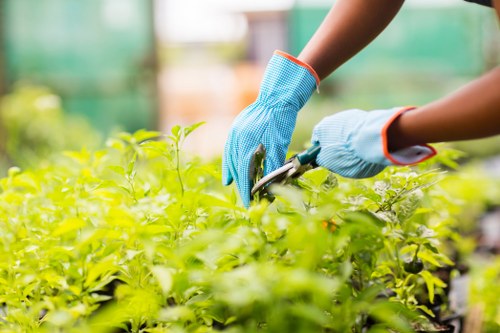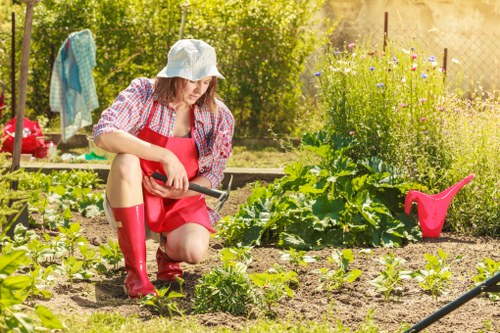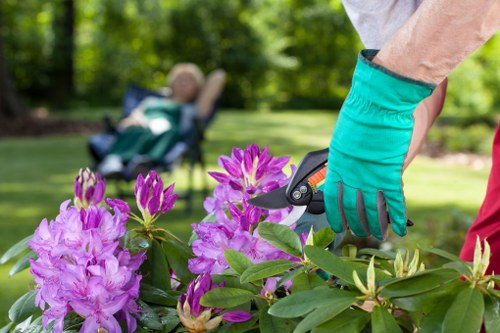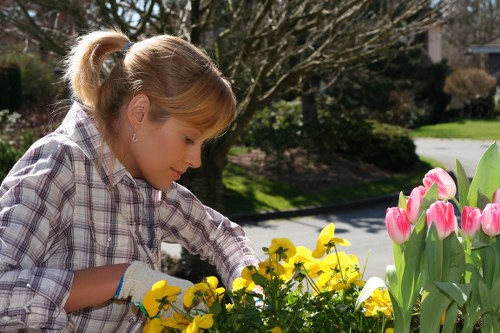Garden Fence Installation Amersham

Are you considering garden fence installation in Amersham to enhance your property's privacy, security, and overall aesthetic? A well-installed fence can transform your garden into a beautiful and functional space, providing both practical benefits and increased property value. In this comprehensive guide, we'll explore everything you need to know about installing garden fences in Amersham, from choosing the right materials to understanding local regulations.
Amersham, a picturesque town in Buckinghamshire, offers a unique blend of rural charm and modern amenities. Whether you live in the heart of Amersham or in one of the surrounding areas, selecting the perfect fence can complement your home's style and meet your specific needs.
Before diving into the installation process, it's essential to consider the various factors that will influence your decision. These include the type of fence, materials, height, and design, as well as the purpose of the fence—whether it's for privacy, security, or decorative purposes.

Benefits of Garden Fences
Installing a garden fence offers numerous advantages beyond just defining the boundaries of your property. Here are some key benefits:
- Privacy: A fence can create a secluded space, allowing you to enjoy your garden without the prying eyes of neighbors or passersby.
- Security: A sturdy fence acts as a deterrent to potential intruders and helps keep pets and children safe within your garden.
- Protection: Fences can shield your garden from harsh weather conditions, animals, and unwanted weeds.
- Aesthetic Appeal: A well-designed fence can enhance the visual appeal of your property, adding character and style.
- Property Value: Quality fencing can increase the value of your home, making it more attractive to potential buyers.

Choosing the Right Fence
Materials
Selecting the appropriate fence material is crucial for durability, maintenance, and aesthetics. Here are some popular options:
- Wood: Offers a natural look and can be customized with various stains and paints. However, it requires regular maintenance to prevent rot and weathering.
- Metal: Includes options like wrought iron and aluminum, known for their strength and longevity. Metal fences often require less maintenance but can be more expensive.
- Vinyl: A low-maintenance alternative that resists weathering and comes in various styles. Vinyl fences are durable but may lack the charm of natural materials.
- Composite: Made from a blend of wood fibers and plastic, offering the look of wood with enhanced durability.
- Chain-Link: An economical choice that provides security and visibility. Often used for practical purposes rather than aesthetic appeal.
Styles
The style of your fence should complement your home's architecture and your personal taste. Some popular styles in Amersham include:
- Classic Picket: Features evenly spaced vertical boards, adding a traditional charm.
- Modern Slat: Offers a sleek and contemporary look with clean lines and minimalistic design.
- Rail Fences: Comprised of horizontal rails, suitable for spacious gardens and providing a rustic appearance.
- Trellis: Ideal for supporting climbing plants, adding both functionality and beauty.
- Ornamental: Incorporates decorative elements like finials and scrolls for an elegant touch.
Height and Function
The height of your fence should align with its intended purpose. Common height categories include:
- Short Fences (3-4 feet): Perfect for defining garden boundaries without obstructing views.
- Medium Fences (5-6 feet): Provide increased privacy and security, suitable for backs of properties.
- Tall Fences (7 feet and above): Offer maximum privacy and security, often used for enclosing larger areas.

Installation Process
Planning and Measurement
Before installing your garden fence, accurate planning and measurement are essential. Start by:
- Measuring the perimeter of the area where the fence will be installed.
- Identifying any obstacles such as trees, shrubs, or existing structures.
- Determining the fence height based on your needs and local regulations.
- Deciding on the fence style and materials.
Preparing the Site
Proper site preparation ensures a successful installation. This involves:
- Clearing the installation area of debris, rocks, and vegetation.
- Marking the fence line with string or marking paint for accuracy.
- Ensuring the ground is level to facilitate even fence posts.
Setting Posts
Fence posts form the backbone of your garden fence. To set posts:
- Digging holes at regular intervals, typically 6-8 feet apart.
- Ensuring holes are deep enough to provide stability, usually about one-third of the post height.
- Placing posts in the holes and using concrete to secure them for added strength.
- Allowing the concrete to cure fully before proceeding.
Attaching Fence Panels
Once the posts are set, attach the fence panels or rails. This process includes:
- Aligning panels with the posts and ensuring they are level.
- Using nails or screws to secure the panels firmly.
- Ensuring even spacing between panels for a consistent appearance.
Finishing Touches
After installing the main fence structure, add any finishing touches to enhance the look and functionality:
- Applying paint or stain to protect and customize the fence's appearance.
- Installing gates if necessary, ensuring they match the fence style.
- Adding decorative elements like finials or lattice work.

Hiring Professionals in Amersham
What to Look for
While DIY installation is possible, hiring professionals can ensure a high-quality and durable fence. When selecting a contractor in Amersham, consider the following:
- Experience: Look for companies with a proven track record in fence installation.
- Reputation: Check reviews and ask for references to gauge customer satisfaction.
- Certification: Ensure the contractor is licensed and insured.
- Portfolio: Review previous projects to assess their style and quality.
- Quotes: Obtain detailed estimates from multiple contractors to compare pricing.
Cost Considerations
The cost of garden fence installation in Amersham varies based on several factors:
- Materials: Different materials have varying costs; for example, wood is generally less expensive than metal.
- Height and Length: Taller and longer fences require more materials and labor, increasing the overall cost.
- Design Complexity: Intricate designs or custom features can add to the cost.
- Labor: Hiring experienced professionals may be more costly but ensures quality workmanship.
On average, homeowners in Amersham can expect to spend between £20 to £50 per linear foot, depending on the choices made.
Maintenance Tips
Proper maintenance extends the life of your garden fence and keeps it looking its best. Here are some essential maintenance tips:
Regular Inspection
Periodically check your fence for signs of wear, damage, or instability. Look for:
- Loose or broken boards.
- Rust on metal fences.
- Rot or decay in wooden fences.
- Gate hinges and latches for smooth operation.
Cleaning
Keep your fence clean to prevent buildup of dirt, mold, and mildew. Use the following methods based on the material:
- Wood: Wash with a mild detergent and water, then allow to dry completely.
- Metal: Wipe down with a damp cloth and use rust-resistant paint if necessary.
- Vinyl: Rinse with water and use a soft brush for stubborn stains.
Repairs
Address any damage promptly to prevent further deterioration:
- Replace broken or rotten boards in wooden fences.
- Treat rust spots on metal fences with appropriate cleaners and primers.
- Secure loose panels or posts to maintain stability.
Local Regulations and Permits
Before installing a garden fence in Amersham, it's important to be aware of local regulations and obtain necessary permits. These regulations ensure that fences comply with community standards and do not infringe on neighbors' properties.
Planning Permissions
While most garden fences do not require planning permission, certain conditions may necessitate it:
- Height Restrictions: Fences exceeding a certain height (usually 2 meters) may require approval.
- Location: Fences near boundaries or highways might be subject to specific guidelines.
- Historical Areas: Properties in conservation areas may have stricter rules regarding fence materials and designs.
Neighbor Consultation
It's courteous and often necessary to discuss your fencing plans with your neighbors. This helps avoid disputes regarding boundaries and ensures mutual agreement on fence placement and style.
Building Codes
Adhering to local building codes is essential for legal compliance and safety. Common codes include:
- Fencing height and setback requirements.
- Materials and construction standards.
- Safety features, especially for fences around pools or play areas.
Nearby Areas to Amersham for Fence Installation
Amersham is surrounded by several charming areas, each offering unique features that may influence your fence installation choices. Here are some of the closest areas:
- Chesham: Located just north of Amersham, Chesham boasts a vibrant town center with excellent services.
- Great Missenden: Famous for its literary connections, this area offers a serene environment perfect for garden enhancements.
- Sunningdale: A nearby village known for its spacious properties, ideal for larger fence installations.
- Little Chalfont: Offers a mix of rural and suburban settings, suitable for various fence styles.
- Longwick: A peaceful area with ample green spaces, perfect for natural-looking fences.
- Princes Risborough: Known for its historic buildings, requiring fences that complement traditional architectures.
- Manipongo Park: A suburban area with diverse housing styles, offering flexibility in fence designs.
- Finchley Green: Close to Amersham, this area features a mix of modern and classic homes.
- Aylesbury: Though slightly farther, Aylesbury provides a broader range of fencing services and materials.
- Varndon: A quaint village near Amersham, ideal for rustic and classic fence styles.
- Chieveley: Offers a countryside atmosphere, suitable for durable and weather-resistant fences.
- West Heath: A residential area with a mix of property types, allowing for versatile fencing options.
- Larchwood: Featuring modern homes, this area is perfect for contemporary fence designs.
- Chalk Hill: Known for its scenic views, requiring aesthetically pleasing and unobtrusive fences.
- Eastbury: A rural locale offering ample space for extensive fence installations.
Conclusion
Installing a garden fence in Amersham is a significant investment that can greatly enhance your property's functionality and beauty. By carefully selecting the right materials, style, and height, and by adhering to local regulations, you can ensure a successful installation that meets your needs and complements your home's aesthetic.
Whether you choose to hire professionals or undertake the project yourself, proper planning and maintenance are key to a long-lasting and attractive fence. With the picturesque surroundings of Amersham and its nearby areas, a well-installed fence can make your garden a private oasis and a source of pride.
Frequently Asked Questions
1. Do I need a permit to install a garden fence in Amersham?
Most garden fences in Amersham do not require a permit. However, if your fence exceeds the height restrictions or is located in a conservation area, you may need to obtain planning permission. It's best to consult with the local council before starting your project.
2. What is the most durable fencing material for gardens in Amersham's climate?
Metal and composite materials are highly durable and suitable for Amersham's climate. They resist weathering and require minimal maintenance compared to wood, which may rot or require regular treatment.
3. How long does garden fence installation typically take?
The installation time varies based on the fence's size, material, and complexity. On average, a professional installation for a standard-sized garden fence can take between one to three days.
4. Can I install a garden fence myself, or should I hire a professional?
While DIY installation is possible, hiring a professional ensures a high-quality and durable fence. Professionals have the necessary tools and expertise to handle challenges and ensure compliance with local regulations.
5. How can I maintain my garden fence to ensure its longevity?
Regular maintenance includes inspecting for damage, cleaning based on the material, and making necessary repairs promptly. Applying protective coatings like paint or stain can also extend the fence's lifespan.